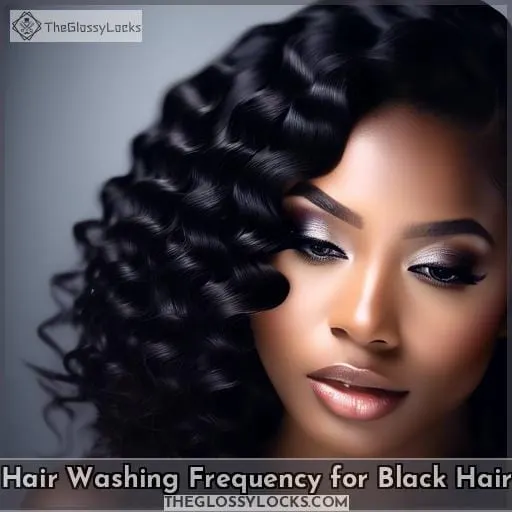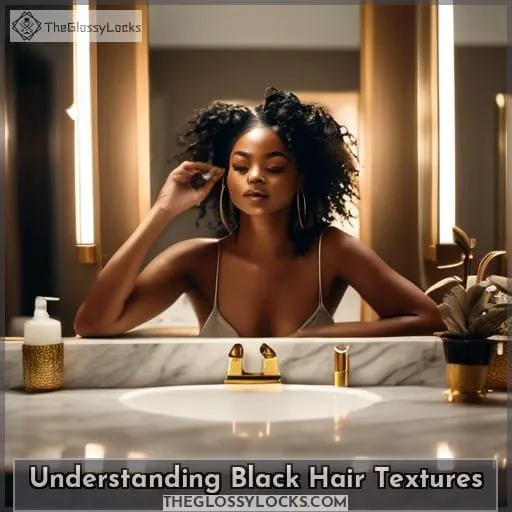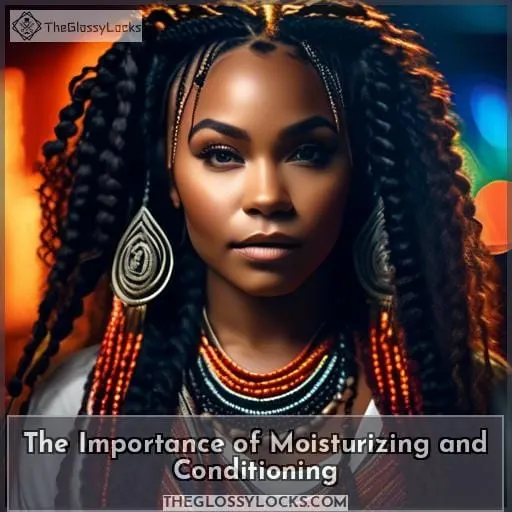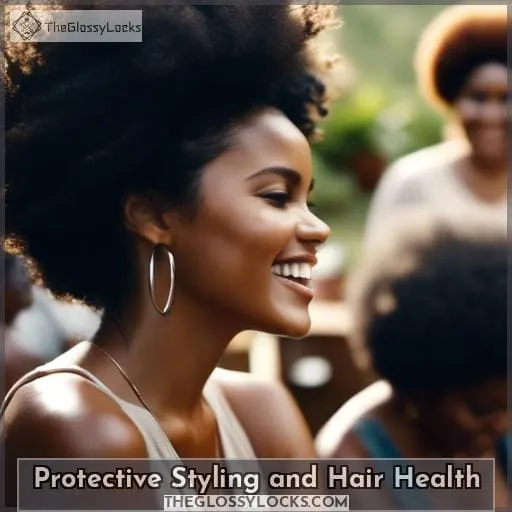This site is supported by our readers. We may earn a commission, at no cost to you, if you purchase through links.
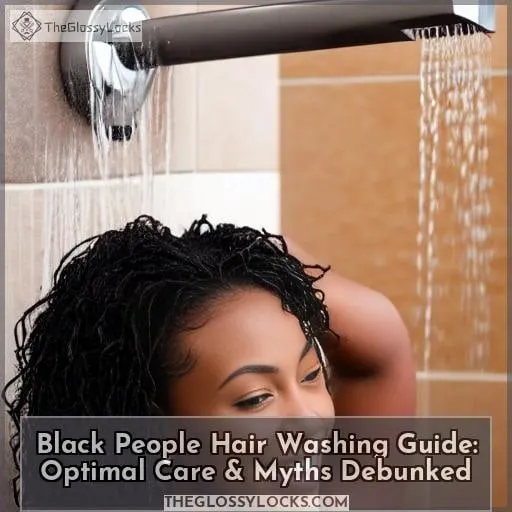
Your hair’s health hinges on understanding its unique needs, debunking misconceptions, and adopting the right washing practices. Whether you’re dealing with tight coils or lush kinks, this guide will help you navigate the essentials of black hair care, from optimal washing intervals to the critical role of moisturizing and protective styling.
Get ready to embrace your hair’s natural beauty with confidence and pride.
Table Of Contents
Key Takeaways
- Black hair should be washed every 7 to 14 days to prevent it from becoming overly dry and prone to breakage, with adjustments made for lifestyle factors such as frequent exercise.
- It’s important to use sulfate-free shampoos and conditioners that contain natural oils to avoid stripping the hair of its natural moisture and to accommodate hair porosity.
- Deep conditioning is crucial for maintaining moisture, improving hair elasticity, and promoting overall hair health. Regular conditioning after shampooing helps keep black hair hydrated and manageable.
- Protective styling, when done correctly, can safeguard hair from environmental damage and reduce manipulation. However, it’s essential to avoid tight styles that can strain the hair and scalp, and to trim split ends regularly to prevent breakage.
Do Black People Wash Their Hair
Yes, black people do wash their hair, but the frequency and methods may differ due to the unique texture and moisture needs of their hair. Typically, black hair is washed every 7 to 14 days to prevent it from becoming too dry.
Hair Washing Frequency for Black Hair
You’ve probably heard that washing your hair too often can be harmful, especially for black hair.
But let’s set the record straight: your lifestyle and hair texture are key to finding your perfect wash routine.
Don’t be fooled by the myth that daily washing is a must; it’s all about what works for you and your hair’s unique needs.
Optimal Washing Intervals
When it comes to washing black hair, it’s not a one-size-fits-all routine. Your hair is as unique as you are, so let’s dive into the nitty-gritty of keeping those locks luscious and healthy.
- Find Your Sweet Spot: Aim to wash your hair every 7 to 14 days. Black hair thrives with less frequent washing, keeping it from drying out and breaking.
- Listen to Your Lifestyle: If you’re hitting the gym and breaking a sweat, feel free to wash your hair every 5 to 7 days. Your scalp will thank you for it.
- Treat After Treatment: Got your hair relaxed? Hold off on the shampoo for at least a week to let your hair’s natural oils do their magic.
- Protective Styles Need Love Too: Washing braids or protective styles every 2 weeks keeps them fresh and your hair healthy. You can even stretch it to 3 weeks if you’re gentle.
Impact of Lifestyle on Washing Frequency
Your lifestyle plays a huge role in how often you should wash your hair. If you’re always on the move, hitting the gym, or living it up outdoors, your hair might need a wash more frequently to keep it fresh and encourage growth.
But here’s the twist: not all hair types or lifestyles demand the same regimen. Black women, with their diverse hair textures, might find that less is more to prevent dryness and breakage.
So, before you dive into a sea of product recommendations and home treatments, consider your daily grind. Are you a homebody or a gym fanatic? Your answer could be the secret sauce to unlocking your hair’s potential.
The Myth of Daily Washing
You might think you need to wash your hair every day to keep it healthy, but that’s not always the case, especially for black hair. Daily washing can strip your hair of natural oils, leading to dryness and breakage.
Instead, listen to your hair’s needs. If you’re using a lot of products or your scalp feels itchy, it might be time for a cleanse. But remember, too much of a good thing can lead to hygral fatigue, where your hair gets weak from over-moisturization.
So, find that sweet spot for washing frequency that keeps your hair happy without overdoing it. And don’t fall for the myth that black hair doesn’t need regular washing; just choose the right products and intervals for your unique hair texture.
Understanding Black Hair Textures
Black hair is as diverse as the individuals it belongs to, with a wide range of textures and care needs. Understanding your unique hair type is crucial, as it influences how you should approach your hair care routine.
Hair analysis can be a valuable tool in this process, helping to tailor your regimen to your hair’s specific characteristics and growth patterns.
Misconceptions about the strength and growth of Black hair abound, but with the right knowledge and care, you can nurture your hair to its fullest potential.
Variety in Textures and Care Needs
Your black hair is a tapestry of textures, each strand with its own story. Whether your curls spiral tightly or wave with a gentle bounce, understanding your unique texture variation is key.
It’s not just about hair styling; it’s about embracing the natural hair dance. Hair density, porosity levels, and scalp sensitivity are the unsung heroes in your hair care saga.
White women have their own hair tales, but yours is a rich narrative of hair color and maintenance, woven with courage and a dash of humor. So, let’s dive into the world of your hair, where every curl counts and every kink is king.
The Role of Hair Analysis in Care
Diving into your hair’s unique story, think of hair analysis as your personal detective. It’s all about understanding your hair’s porosity and protein sensitivity, alongside your scalp’s health.
But don’t forget, the environment plays a role too. This isn’t just about slapping on any product; it’s about decoding what your hair truly needs.
So, let’s embark on this journey together, shall we?
Misconceptions About Black Hair Strength and Growth
Let’s dive into the world of black hair, where strength and growth are often misunderstood. You’ve probably heard a few things about black hair that made you scratch your head, wondering if your beautiful locks are from another planet.
Well, let’s set the record straight with a dash of humor, a pinch of curiosity, and a whole lot of truth.
- Genetics play a huge role in your hair’s characteristics, but they don’t dictate your hair’s destiny. Think of them as the starting point, not the finish line.
- Hair porosity is like your hair’s thirst level. High porosity hair is like a sponge that can’t hold water, while low porosity hair is like that friend who refuses to share their drink. Knowing this can change your hair game.
- Traction alopecia sounds like a fancy dance move, but it’s actually a warning about too-tight hairstyles. Love your edges as you love your favorite snacks: gently and with care.
- Breakage is the villain in your hair’s superhero story. Protective styles are the sidekicks helping to save the day, keeping your hair from breaking under pressure.
The Importance of Moisturizing and Conditioning
Maintaining the health of black hair goes beyond just regular washing. It’s crucial to focus on deep conditioning and avoiding harsh chemicals.
These steps are key to preventing dryness and promoting hair growth, ensuring your hair stays strong and hydrated.
Conditioning After Shampooing
After diving into the diverse world of black hair textures, it’s crucial to talk about the next step in your hair care routine: conditioning after shampooing. This isn’t just a step; it’s your hair’s best friend, offering a hydration hug and a frizz-fighting fist bump.
Think of conditioner as the superhero that swoops in after shampoo has done its cleansing job, restoring moisture and adding a protective layer to each strand. Whether you’re using a rinse-out, leave-in, or deep conditioner, the goal is the same: to leave your hair feeling as majestic as it deserves.
Conditioner benefits are vast, ranging from detangling knotted nightmares to adding shine that could rival the sun. But not all conditioners are created equal. The ingredients in your conditioner can make or break (literally) the health of your hair.
Look for products packed with natural oils, shea butter, or aloe vera, and steer clear of harsh chemicals that can strip your hair of its natural glory.
How often you condition can vary based on your hair’s needs and the battles it faces daily. Some warriors might need the reinforcement of daily conditioning, while others might find their strength in a less frequent regimen.
Choosing the right conditioner is like selecting your armor before heading into battle. With brands aplenty, from SheaMoisture to Cantu, your arsenal is vast. But remember, the best conditioner for you is the one that meets your hair’s specific needs, not just what’s trendy.
Whether you’re experimenting with homemade concoctions or sticking to store-bought saviors, the key is to find what makes your hair feel like royalty.
So, as you continue your journey through the realms of black hair care, remember that conditioning isn’t just a step; it’s a commitment to nurturing your hair’s natural beauty and strength. Let’s embrace the adventure, experiment with conditioner frequency, ingredients, and brands, and watch as our hair thanks us in volumes.
Avoiding Harsh Detergents
After you’ve treated your hair to a nourishing conditioner, it’s crucial to consider the next step in your routine: shampooing. But not just any shampoo will do. You’ll want to sidestep those pesky harsh detergents that can strip your hair of its natural oils.
- Opt for sulfate-free shampoos to ensure gentle cleansing without the harshness.
- Seek out products that promote scalp health, as a happy scalp means happy hair.
- Understand your hair porosity; it’ll guide you to the right products.
- Arm yourself with product knowledge—know what’s in your shampoo and why it matters.
- Remember, a little humor: Don’t let your shampoo be ruffer on your hair than a playful pup in a mud puddle!
By choosing wisely, you’re not just washing your hair; you’re embracing a ritual that celebrates and protects your unique crown.
Hygral Fatigue and Hair Health
After dodging harsh detergents like a pro, let’s dive into the world of hygral fatigue.
Imagine your hair as a sponge, soaking up moisture and then drying out. Too much of this cycle, and you’re looking at hygral fatigue, where your hair says, Enough! This isn’t just about being overly enthusiastic with your conditioner; it’s a balancing act.
Your hair’s cuticle takes a hit, leading to frizz, breakage, and a texture that’s more ‘meh’ than magnificent.
But fear not! Keeping an eye on protein balance, scalp health, and moisture retention can turn the tide.
Protective Styling and Hair Health
When it comes to protective styling and maintaining the health of your black hair, it’s crucial to debunk common myths and understand the importance of proper technique.
You might’ve heard that all braids are inherently protective, but the truth is, the tension from styles that are too tight can lead to breakage and hair loss.
Regular trimming is also essential; it may seem counterintuitive if you’re aiming for length, but getting rid of split ends actually promotes healthier growth.
Myths About Braids and Protective Styles
Let’s bust some myths about braids and protective styles, shall we? You might think all braids are your hair’s best friends, but hold your horses! Not all braids are created equal. Some can be more like frenemies, especially if they’re too tight. Imagine your scalp crying out for a breather because those braids are pulling with the might of a toddler on a sugar rush.
And here’s a kicker: protective styles aren’t just a set-it-and-forget-it deal. Your hair underneath? It still needs love and attention. Skipping the TLC can lead to a wild surprise of breakage and hair loss when you finally let your hair down.
So, while you’re rocking those braids or twists, remember, your scalp and hair aren’t out of the woods.
In short, not all protective styles are the protective knights in shining armor we might hope for. Some can lead to tension, breakage, and even hair loss if not done right. Keep those braids friendly, not too tight, and don’t forget about the hair underneath.
Importance of Tension Awareness in Styling
Continuing from the myths surrounding braids and protective styles, let’s dive into why tension awareness is crucial when you’re rocking those styles.
- Tension Styles: Too tight and you’re in for a world of hurt—literally. It’s not just about discomfort; it’s about the health of your scalp and hair.
- Tension Control: Find that sweet spot where your style is secure but not pulling at your roots. It’s like finding the perfect pair of jeans—comfortable yet flattering.
- Tension Protection: Protect your edges! They’re the delicate heroes of your hairline. Treat them gently, like a fragile garden that needs tender care.
Regular Trimming for Hair Health
Continuing from the importance of tension awareness in styling, let’s talk about regular trims for hair health. You know how a gardener prunes plants to promote growth? Similarly, snipping those split ends can prevent further hair damage and breakage.
Here’s a quick guide to keep your trims on track:
| Trim Styles | Hair Damage | Scalp Health |
|---|---|---|
| Dusting | Minimizes | Maintains |
| Blunt Cuts | Removes | Encourages |
| Shaping | Prevents | Supports |
Community and Education in Black Hair Care
You’ve learned that your hair is unique and that the care it requires is just as individual as you are. It’s time to embrace the diversity of black hair and debunk the myths that have long surrounded it.
By educating yourself and others, you can challenge stereotypes and discover the best practices for your hair’s health and growth. Don’t be afraid to experiment with different hair care methods and share what you learn; your experiences could be invaluable to someone else on their hair care journey.
Challenging Stereotypes Through Education
You’ve got to shake off those old hair care myths like a dog shedding water after a swim! It’s time to embrace a hair care routine that’s as unique as you are.
Forget the one-size-fits-all approach; your locks deserve a custom-fit plan. Dive into hair care experimentation with the gusto of a kid in a candy store, because discovering what makes your tresses tick is a journey worth taking.
Let’s bust those stereotypes and spread the word that diverse hair types aren’t just beautiful—they’re a canvas for creativity. So, let’s champion stereotype awareness, encourage an individualized approach, and celebrate the beauty of breaking misconceptions together.
The Value of Hair Care Challenges and Experimentation
Continuing from the importance of challenging stereotypes, let’s dive into the value of hair care challenges and experimentation. You’re not just trying new styles; you’re joining a vibrant community that’s all about embracing and understanding the unique beauty of black hair.
- Discover the joy of community support; you’re never alone on this journey.
- Tap into online resources that are a treasure trove of wisdom.
- Share personal experiences; your story could be the key that unlocks someone else’s confidence.
- Learn about hair porosity; it’s not just jargon, it’s a game-changer for your hair routine.
- Prioritize scalp health; it’s the soil from which the garden of your hair flourishes.
Frequently Asked Questions (FAQs)
Can diet affect black hair growth?
Yes, your diet can significantly influence black hair growth.
Eating a balanced diet rich in essential nutrients like omega-3 fatty acids, zinc, protein, and vitamins can nourish your scalp and hair, promoting healthier and potentially faster growth.
Foods like eggs, leafy greens, and fatty fish are particularly beneficial.
However, deficiencies in key nutrients may slow hair growth or even cause hair loss, so it’s crucial to ensure you’re getting a wide variety of nutrients to support hair health.
How does hard water impact black hair?
Imagine you’re stepping into a shower, excited for a fresh start, only to find your hair turning into a straw-like mess.
Hard water, packed with minerals, can leave black hair feeling stiff, dull, and prone to breakage.
It’s like trying to comb through a bird’s nest!
Are supplements beneficial for black hair?
Supplements can indeed be a game-changer for black hair, offering a buffet of nutrients like biotin, vitamin E, and folic acid that are like a spa day for your strands.
Can stress cause issues with black hair?
Just like a ship braving the stormy seas, stress can rock the foundation of your black hair.
Does altitude affect black hair health?
Altitude can indeed play a role in the health of your hair, making it a bit of a roller coaster ride for your locks.
At higher altitudes, the air gets thinner and drier, which might leave your hair feeling like a parched tumbleweed in the desert. This lack of moisture can lead to dryness, breakage, and a static electricity party you never wanted to attend.
So, if you’re living it up in the highlands or planning a mountain retreat, it’s not just your hiking boots that need prepping. Your hair care routine might need a little altitude adjustment too, with extra hydration to keep those strands from crying out for moisture.
Conclusion
Just as a phoenix rises from its ashes, embracing the natural beauty and strength of black hair can be a transformative journey.
Your hair’s texture dictates its care needs, debunking the myth that black hair is inherently strong and can endure harsh treatments. Moisturizing and conditioning are non-negotiable steps for keeping your hair resilient against breakage.
Protective styles, when done correctly, safeguard your hair while it grows. Finally, educating yourself and others fosters a community that celebrates the diversity and beauty of black hair.
Embrace this knowledge with curiosity, humility, and courage, and watch your hair flourish.

